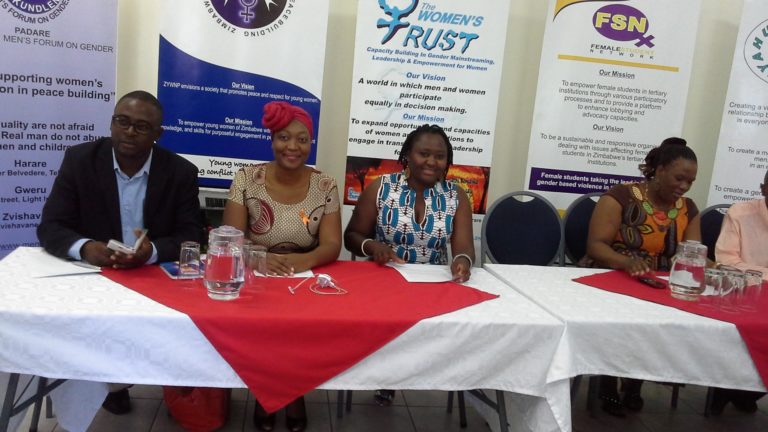
One month ago, Kenyan women took to the streets protesting against the government for short-changing the appointment of more women into the cabinet.
Now, one month later, all cabinet appointments have been made and Kenya has once again failed to attain the two-thirds (2/3rd) threshold for gender parity within its political sphere. From the agitation witnessed last month by the civil society and the on-going strategizing occurring within women organizations and caucuses, this will not be the last time women take to the streets to push for political equality in a country that seemingly plays lip-service to this basic right.
Kenya’s Constitution demands that women occupy at least one third of all seats in parliament and one third of all appointed political positions. This is far from the current reality, laying claim to the question – is the government serious about bridging the gender political gap?
Currently, out of the 349 seats in parliament, only 76 members are female representing only 1/5 of the total. According to the constitution, parliament should at least have 117 female members of parliament (MPS) and thus falls short by 41 members. The House of Senate too misses the mark with only 21 women owning seats instead of the 23 demanded by law.
All of this indicates that gender inequality in Kenya’s political system is pervasive and lagging behind its East African neighbors at only 23.5% across government bodies. Rwanda leads with 61%, followed by Tanzania at 36%, Burundi at 36%, Uganda and 34% and South Sudan at 28.5%. With the exception of Rwanda, none of these countries have attained the African Union standard of 50/50 representation of women in all leadership positions including political leadership.
It is disappointing to see a country with an economic and development edge over its neighbors, and with a notably more progressive constitution proclaiming this very equality would fall so far behind in implementing this basic right.
Despite these setbacks, the future is optimistic as women’s rights organizations continue fighting gender inequality. Over the years, the African Women’s Development & Communications Network (FEMNET) has advocated for solid legislations to be entrenched within the political process to ensure women are not left out of political participation.
Alongside national and coalition partners, FEMNET has worked to infuse gender equality legislations and to ensure implementation follows suit by empowering member organizations with policy engagement skills and opportunities to sustain pressure on governments.
Legislation alone is not enough to boost women’s political participation.
Political parties have consistently failed to support and/or nominate women for critical positions, despite a focus on being gender inclusive within their party manifests. Women are also faced with cases of verbal and physical assault during political – including the most recent 2017 elections.
While challenging a patriarchal society where women’s political situation is often frowned upon, these are the stumble-blocks that must be addressed for women to forge ahead.
FEMNET has conducted sustained empowerment and emancipation sessions during which women with political aspirations are prepared and coached on the political dynamics of their ambitions and their awareness skills enhanced. We have also worked with political parties and urged them to remain faithful to their bylaws.
Over the years, these efforts have led to significant progress as advocates continue mobilizing to hold the governments accountable to the clearly proclaimed gender equality clause in the Constitution. The 2017 elections, for example, saw a record six women elected as governors for the first time since the promulgation of the Constitution in 2010. Until now, no woman had ever been elected governor indicating a clear victory in this movement.
Furthermore, in the past several years, women’s political participation has not only increased in numbers in terms of the women lining up to run for office but also in the quality of their participation in successive elections.
Much of this progress can be attributed to the power of networks and coalition building amongst women’s organizations to support and amplify the voices of women leaders.
The League of Kenyan Women Voters, the Kenya Women’s Parliamentary Association (KEWOPA) and the Kenya Women’s Political Caucus for example, have all demonstrated the power of networks to achieve their goals and strengthen women’s political representation across government sectors.
Fostering intergenerational participation in politics and within these networks is another critical approach to boosting women leaders by enabling young women to start early and learn the political landscape. This must be not only in the lead up to an election, but also after as we build strategies to develop a cadre of powerful transitional women leaders.
The most recent protest and demonstration by women in January 2018 was spearheaded by FEMNET member organizations like the Center for Rights Education & Awareness on Women (CREAW). This civic activism marked yet another significant statement that women’s political participation should not be taken for granted and that we will not stand by silently witnessing these inequalities.
Like several other African countries where FEMNET operates, mobilizing across organizations, generations, and sectors for the realization of women’s political participation and gender equality in political leadership is a solid fixture and lies at the heart of all equality processes. Kenya is alert to the reality that with this right guaranteed within the law comes the tireless vigilance to ensure that it is implemented and sustained.
